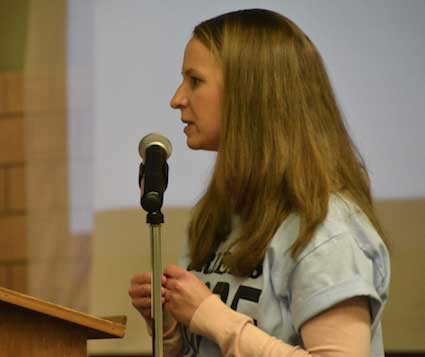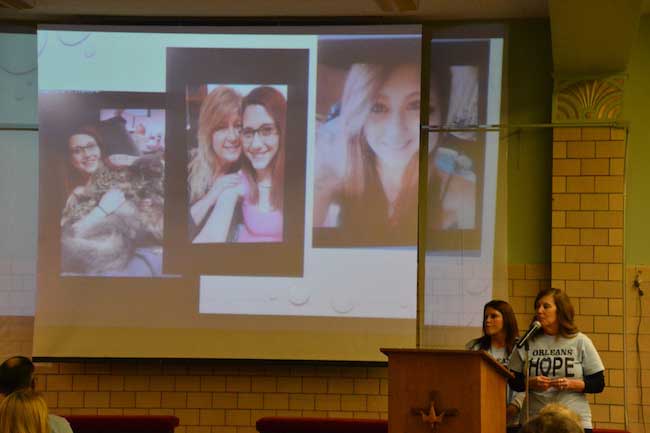Forum shows heartache with opioid crisis
‘We are bleeding and we are dying. We have to stop these drugs from coming into our community.’ – District Attorney Joe Cardone

Tami Ashton speaks about her daughter’s addiction which ultimately claimed her life on June 27, 2016 at age 34.
MEDINA – There was anger, despair, frustration and hope – all expressed on Thursday night during a community forum about the opioid crisis in the community, which has caused several recent deaths and devastated many families.
“We’re done burying our kids,” said Tami Ashton. “We need to come together as a community and do something and the time is now.”
Her daughter, Christina Ashton, died from a drug overdose on June 27, 2016. Christina had been clean for 19 days. Her mother left the house for a 40-minute errand. When she came back, she found her daughter slumped over and not breathing in the backyard. Someone dropped off heroin and her daughter took all of it. Christina was 34.
“It’s killing our children and destroying our families,” said Ashton, who has become an addiction recovery coach with GCASA.
Thursday’s forum was attended by about 100 people and lasted more than 2 hours. Three people shared how their drug addictions escalated, nearly killing them.

Tiffany Neroni shared how drugs nearly killed her when she was a teen-ager. She has been sober now for a decade.
Tiffany Neroni was only 11 when she started smoking marijuana and taking pills with an older boyfriend. Drugs took over her life as a teen-ager. Her family had to send her away to get the treatment she needed, and not to be a danger to her siblings.
Neroni once was so high she didn’t come home for several days. A missing persons report was filed and she was found in Rochester.
She has been sober now for 10 years and wants to help others as a peer advocate, helping to ensure there is support after an addict completes treatment. Families of addicts also need services, Neroni said.
The addicts “have strengths and skill sets,” Neroni said. “They are valuable to the community.”
With treatment and support, they can be dedicated employees, business owners and other community assets.
A husband and wife from Niagara County shared their story of drug abuse that nearly claimed their lives. The husband needed to be revived with Narcan after a heroin overdose.
The husband was working in construction and injured his back. He took prescribed painkillers. When the prescription expired, he continued to use painkillers and turned to more hardcore drugs, including heroin, which were cheaper to buy than painkillers.
He committed crimes to pay for drugs, and was jailed for burglary and grand larceny. A drug diversion program through Niagara County, which required treatment, helped him to stop the cycle of drug use and crime.

District Attorney Joe Cardone said there is an epidemic of drug addiction in the community and country. “I’m angry about what’s happening in our society.”
His wife also had been using drugs for many years. She credited Vivitrol for helping her to stay clean. Vivitrol is a treatment that blocks the effects of opioid addiction. She hasn’t felt the triggers or pull to use drugs for more than a year.
District Attorney Joe Cardone has been the county’s top prosecutor for about 26 years. The drug crimes when he started tended to be misdemeanors with marijuana and recreational drugs.
Now, the county is facing an “epidemic” with heroin laced with fentanyl which is proving deadly, Cardone said.
“We are bleeding and we are dying,” the DA told the crowd. “We have to stop these drugs from coming into our community.”
He said the best way to fight the drug problem in the county is keep people from using it. He urged residents to let law enforcement know if people are selling drugs in the community. Cardone said he is frustrated with residents who blame others for “snitching” to law enforcement. Cardone said those tips to law enforcement can save lives and prevent misery in the community.
Doctors overprescribed painkillers for years which he said has fueled the national drug problem.
“Every small town in the United States has drugs,” he said. “We have to stop the flow of drugs into our country.”
Her praised the effort by GCASA and the Sheriff’s Office to have more treatment and services for residents battling drug addiction.
“Thank God for GCASA. Thank God for the sheriff and what he is doing,” Cardone said. “But it’s only a Band Aid.”
Kathy Hodgins, the director of treatment services for GCASA in Orleans County, said there are many services available in the county to assist people fighting addictions. She urged people to stop by GCASA in Albion, 249 East Ave., or call at (585) 589-0055.

Don Snyder, a chaplain for the Orleans County Sheriff’s Office, wants the community to lift the stigma for people suffering from drug addictions.
The Sheriff’s Office has started a new CARES program that links people leaving the jail or treatment programs with volunteer mentors.
Don Snyder, a retired chaplain who worked in state prisons, is volunteering as a chaplain for the Sheriff’s Office and helping people go through the training to become a mentor or recovery coach.
Addicts recover “in different ways and at different speeds,” Snyder said. He urged the community to not attach a stigma to people fighting addictions.
Many have been pulled into drug abuse through painkillers, or from using drugs to mask other pain or childhood trauma.
Scott Wilson, the county’s jail superintendent, said the jail has stepped up its services for addicts connecting them to treatment programs, health insurance and Vivitrol. The county pushes to have a transition from the jail to GCASA or another treatment program.
Sheriff Randy Bower said Narcan has proven a life-saver in the county with 26 people saved from a fatal overdose this year in Orleans County. Those are just the calls to the 9-1-1 center. Bower said more Narcan doses may have been administered without a 9-1-1 call.
GCASA has been offering Narcan training and giving away the doses. On Thursday, there was a training at the end of the meeting and people were given Narcan nasal sprays.
“Narcan continues to make a difference in saving someone’s life,” said Diana Fulcomer, a prevention educator with GCASA.










































































